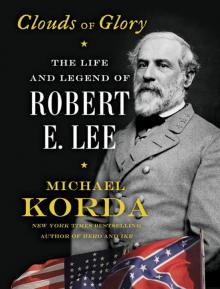- Home
- Michael Korda
Clouds of Glory Page 33
Clouds of Glory Read online
Page 33
In the spring of 1861 Lee performed something of a miracle. In the twelve days between his assuming command of Virginia’s armed forces and May 5, Lincoln’s deadline when those in arms against the United States must “retire peaceably to their respective abodes,” Lee created the rudiments of an army to be reckoned with, not yet strong enough to take the offensive, but perhaps strong enough to defend Virginia at all but a few exposed points. Young Lieutenant Walter H. Taylor, who joined Lee’s staff on May 3, was perhaps the most accurate chronicler of Lee’s generalship and his grasp of logistics, and the closest of his aides to him, throughout the war. Taylor was not immune to Lee’s charisma—“I was at once attracted and greatly impressed by his appearance . . . he appeared every inch a soldier and a man born to command,” he wrote—but seeing beyond Lee’s natural gift for projecting gravitas, Taylor rapidly formed a clear understanding of his new commander’s remarkable power of concentration, his patience, and his extraordinary professional skill. Taylor also realized at once that Lee hated the endless, time-wasting correspondence he was forced to deal with, despite being a prompt and tireless letter writer himself to family and friends. The young man quickly transformed himself into his commander’s amanuensis, sparing Lee hours of thankless toil. Lee, Taylor commented, was “not satisfied unless at the close of his office hours every matter requiring prompt attention had been disposed of,” echoing the judgment of that ultimate soldier and administrator the Duke of Wellington, “The business of the day must be done within the day.”
Nobody was in a better position to understand the problems Lee faced than Taylor, who saw almost all Lee’s correspondence. There was no shortage of manpower as such—Virginians were so eager to volunteer to defend their state that Lee had to turn away those he could not arm—but there was very little in the way of organized training or of the military staff and structure needed to turn them into a real army. Former Governor Wise’s offer to form companies of sharpshooters, each man armed with his own rifle, from the rural areas of western Virginia, though warmly supported by President Davis and Governor Letcher, was typical of the kind of amateur military thinking that Lee felt obliged to discourage. However skilled the riflemen of western Virginia might be at putting meat on the table at home, their rifles were of different calibers, complicating Lee’s logistic problems, and were not fitted with any means of attaching a bayonet, in an age when the massed bayonet charge was still considered to be the deciding factor in battle.
Lee struggled with shortages of everything his army would need. Muskets were in such short supply that many volunteers were issued with smooth-bored flintlocks, like those of the Revolutionary War, rather than the more modern percussion weapons. Soldiers who received the older weapons often felt humiliated and enraged. Almost everything else was also in short supply, including uniforms, shoes, cavalry sabers, and pistols, as well as tents, blankets, horses, mules, and wagons—the last three to remain critical problems throughout the war. Taylor’s admiration for Lee never failed—to a friend who had worked with him at the Bank of Virginia before the outbreak of war Taylor wrote, “Oh! Mr. Barrot, he’s a trump, a soldier, a gentleman & above all a Christian.” Taylor quickly adapted himself to Lee’s working day, which began after an early breakfast and continued until well past eleven at night, as well as to Lee’s abstemious habits. But despite Taylor’s premature hero worship of his boss, whether Lee knew it or not, his role had become that of a skilled military bureaucrat, the mid-nineteenth-century southern equivalent of Dwight D. Eisenhower eighty years later, before Ike got out from behind his desk and took over active command of Operation Torch, the Allied invasion of North Africa.
Lee was deluged with problems. It was one thing to call up the militia and volunteers, and another to decide how long they would serve. On this crucial point Lee and the Virginia Convention differed widely. Governor Letcher and the convention wanted to limit the term of enlistment—many of the members believed that the war would be over quickly, perhaps after a single victory, while Lee, whose opinion on the length of the war was far more pessimistic (and as it turned out, more realistic), wanted the men enlisted “for the duration of the war.” In the end Lee was obliged to settle for an enlistment of one year, with predictable problems in the spring of 1862, as men’s enlistment expired at just the moment when they were most needed.
His problems were further complicated by the move of the capital of the Confederacy from Montgomery to Richmond. The armed forces of Virginia would shortly become part of the Confederate Army, and Confederate troops from other states would inevitably be ordered to take up positions in Virginia. Although Lee and Jefferson Davis had great respect for each other—the stiffness of Davis’s personality and Lee’s dislike of politics make it seem unlikely that they were “friends” in any conventional sense of the word—the integration of Virginia’s government and armed forces into the Confederacy was neither easy nor universally popular. Virginians were apt to presume that they were primus inter pares* and that the defense of Virginia should be under the command of Virginian generals, while troops from other states thought that they were coming to Virginia’s rescue, and in some cases that there was more important fighting to be done nearer home. To read Lee’s correspondence in May and June 1861 is to marvel at both his strategic ability and his tact. However pressed for time he was, and however critical the circumstances, Lee never failed to phrase his commands as suggestions, or to praise even the most recalcitrant of his senior officers.
He grasped at once the strategic reality of Virginia’s position, which can be explained by a simple analogy. If you place your left hand flat before you, fingers and thumb widely separated, and imagine the thumbnail as Richmond, then each of the outstretched fingers represents a point at which the enemy can enter Virginia, and where the geography, the course of a river and its valley, or the direction of mountain ranges might favor an attacker, and offer him natural “access points.” Moving from east to west, the index finger represents the long peninsula between the York and the James rivers, which was easily accessible to the enemy because of Union naval power, and which if seized boldly could cut Richmond off from the rest of Virginia and the South in one blow. The middle finger represents Alexandria and the path of the Orange and Alexandria Railroad, by which the enemy might reach the vital railway junction at Manassas, and again isolate the capital. The ring finger represents the Shenandoah Valley, from Harpers Ferry south to Waynesboro and Lynchburg, where the enemy could not only cut Virginia in two but also cut the Richmond and Danville Railroad connecting Richmond to the West, and allow an army to follow the path of the James River eastward with few natural obstacles toward Richmond. The little finger represents the possibility of advancing into Virginia from Pennsylvania and Ohio along the Monongahela and Cheat rivers, and then through gaps in the Blue Ridge Mountains to flank Richmond. The first (index) finger was of particular concern. Washington’s preponderance of naval power would make a landing on the peninsula an attractive strategic move—Fort Monroe, which Lee had helped build, was still in Union hands. A Union army could be landed at Newport News and indefinitely supplied from there by sea. The last of these possibilities (the little finger) was also of immediate concern—mountainous northwestern Virginia was not slave-owning country; it was largely populated by settlers from Pennsylvania who were instinctively pro-Union and deeply opposed to secession. A vigorous thrust there by Union forces toward Grafton might generate considerable local support. In addition one of the major railway lines to the area ran there from the north, in Pennsylvania, making it easy to supply any Union advance. Strung out along a border of at least 400 miles, these four vulnerable points were widely separated, all the more so since they were not directly linked to one another or to Richmond by railway; Harpers Ferry and Grafton were also separated by a daunting chain of mountains running from north to south. The east-west orientation of railway routes to the north of Virginia gave the Union the equivalent of “interior lines” of communication, allowing
for quicker movement of troops from one point of attack to another. Lee also had to contend with the strong possibility that Union forces would attack two or more points simultaneously, dangerously stretching Confederate troop strength, as well as his overburdened and inconveniently linked supply routes—if there was one thing the builders of railway lines in Virginia had not anticipated it was supplying armies defending the state’s northern border.
Lee endeavored, with some success, to provide each of the points that concerned him with a strong commander and an adequate supply of arms. He attached great importance to Harpers Ferry, not only because of its position but also because of the Federal arms factory that was located there. One of his first letters on taking command of the armed forces of Virginia was to the former VMI professor he had assigned there to defend it.
HEADQUARTERS VIRGINIA FORCES
Richmond, Va., May 1, 1861
Col. T. J. Jackson, commanding Harper’s [sic] Ferry, Va.:
COLONEL: Under authority of the governor of the State, you are directed to call out volunteer companies from the counties adjacent to Harper’s Ferry . . . including five regiments of infantry, one regiment of cavalry, and two batteries of light artillery, of four pieces each. The average number of enlisted men in each company will be eighty-two, and the troops will be directed to rendezvous at Harper’s Ferry. You will select, as far as possible, uniformed companies with arms, organize them into regiments under the senior captains, until proper field officers can be appointed. You will report the number of companies accepted in the service of the State under this authority, their description, arms, &c. Five hundred Louisiana troops, said to be en route for this place, will be directed to report to you, and you will make provisions accordingly.
You are desired to urge the transfer of all the machinery, materials, &c., from Harper’s Ferry, as fast as possible, and have it prepared in Winchester for removal to Strasburg, whence it will be ordered to a place of safety. . . . Should it become necessary to the defense of your position, you will destroy the bridge across the Potomac. . . .
I am, sir, &c.
R. E. LEE,
Major-General, Commanding
This is typical of Lee’s orders; methodical, detailed, practical, and containing not a hint of ambiguity. Anybody receiving such an order knew exactly what was expected of him. The warning to destroy the bridge across the Potomac was sound practical advice from a man who had been there and crossed it. Lee’s grasp of geographical realities was that of an experienced military engineer and mapmaker; he could see at a glance which points had to be taken or defended, and how to take advantage of the terrain. In the course of May and June his letters are strewn with sound military advice—he requested a spur line to be laid to connect Richmond and Petersburg, explained exactly how to build a fortified artillery battery to protect “the land approaches to Yorktown,” advised how to prepare coarse-grained gunpowder intended for artillery for use in muskets, and warned (correctly) against trying to call up volunteers from what would soon become West Virginia, “as it might irritate, instead of conciliating the population of that region.” He hunted up tents, muskets, haversacks, percussion caps, and mules from every corner of Virginia; questioned whether “the revetment at Fort Norfolk [is] sufficiently protected by earthen-covered ways”; and asked the commander there whether “the parapets of all your redoubts are sufficiently thick and high to resist heavy shot and protect the men within?” He recommended setting steel rails into the ground at a thirty-degree angle to deflect long-range shots from Union ships and explained exactly how to do it; he wisely advised Jackson at Harpers Ferry “not to intrude upon the soil of Maryland,” lest it make the citizens of that state turn away from the Confederacy. He also never failed to take the time to console officers who had to step down in rank as they were transferred from the Virginia armed forces to the Confederate Army: “Recognizing as fully as I do your merit, patriotism and devotion to the State” he wrote to a disappointed Colonel St. George Cocke, “I do not consider that either rank or position are necessary to bestow on you honor, but believe that you will confer honor upon the position.” Even his sharpest rebukes were couched in terms carefully calculated not to offend: “The General regrets to have to remind an officer of your experience of the propriety of adhering to the usages of the military service in relation to official communications. . . . He feels constrained to call your attention also to the necessity of economizing the ammunition issued to the troops. . . . As understood by him, the recent exchange of shots between your batteries on the Potomac and the enemy’s vessels could have no other result than to waste ammunition and to expose our conditions and the strength of the batteries, which was probably the object of his visit.” Lee was a one-man general staff, dealing deftly with major strategic issues and the smallest details of logistics and bruised egos at every level, while all the time making sure that President Davis was kept fully informed and that his ideas about military affairs were taken seriously. It was as if the jobs of General George C. Marshall and General Dwight D. Eisenhower were combined in one man, a remarkable achievement.
Lee recognized at once the need to place an experienced general officer in command at every vulnerable point of danger on the Virginia border, and in making his choices he suppressed entirely his own desire to command in the field and any sign of resentment at the often outsize egos of the generals chosen. Lee wisely placed his friend and West Point classmate Joseph E. Johnston in command at Harpers Ferry, confident that Johnston and Colonel Thomas J. Jackson would work well together. For the forces assembling near Manassas, President Davis and Lee gave the mercurial and flamboyant Creole P. G. T. Beauregard, a member of a wealthy New Orleans family, the command—Beauregard, who had led the attack on Fort Sumter, had been given a hero’s welcome at every stop on the railway from Charleston to Richmond, and had ambitious plans for attacking the Union forces around Washington—plans that Lee was determined to delay. Keeping a firm rein on Beauregard would become one of Lee’s major concerns. The defense of Richmond from the sea was in the hands of Benjamin Huger and John B. Magruder “on opposite sides of Hampton Roads”: Huger on the southern shore of the James River, in Norfolk; Magruder of the northern shore on the peninsula itself, between the James and the York rivers. Neither general was to prove a happy choice—Huger would prove to be slow to advance and too hasty to retreat, while Magruder had the misfortune to interpret Lee’s orders to him too literally at the Battle of Malvern Hill in 1862. Splitting the command between them was probably also a mistake, but both Davis and Lee supposed that since the area was only eighty miles from Richmond they could exercise direct control of any battle that took place there. In western Virginia, confusion reigned. Most of the population remained strongly pro-Union, and after the Confederates suffered a serious defeat at Philippi, south of Grafton, Lee feared that Union forces might march on to Staunton, turning Johnston’s position at Harpers Ferry and cutting off Richmond from the west. Lee reacted quickly by promoting his adjutant general Colonel R. B. Garnett to brigadier general and sending him off to hold a line in the Alleghenies with whatever militiamen could be summoned up. From Richmond, Garnett’s job seemed easy enough; the Alleghenies stretched from north to south in a series of “long parallel ridges,” separated by deep valleys and fast-running rivers, with few roads or towns. Most of the roads, such as they were, followed the valleys; those crossing the mountains from west to east were poor, few, and far between. Union troops advancing from Ohio into northwestern Virginia would need to cross ridge after ridge of wild and heavily forested country, and on any one of these ridges a relatively small number of men, if properly led, ought to be able to hold back an army.
The question of when and where the Union would strike first was answered on May 27, when Lee received an alarming message from General Huger, in Norfolk: “Seven steamers, with troops, have been and are now landing troops at Newport News. Other steamers, with troops, arrived at Old Point this morning.” This was familiar terri
tory to Lee, who had helped to build Fort Monroe and Fort Wool opposite it in Hampton Roads. He knew the shoreline and the bay like the back of his hand. Fort Monroe was (and would remain for the duration of the war) in Union hands, but Lee prudently ordered General Magruder to dig in on a line from Jamestown to Williamsburg to Yorktown, at the narrowest “neck” of the peninsula, about fifteen miles west of Fort Monroe. There was nothing Lee could do to prevent the Union from assembling a large force around Newport News and supplying it by sea while waiting to see whether the Union commander, General Benjamin Butler, would advance up the peninsula, or cross the James River and invest Norfolk, or divide his forces by attempting to do both. Magruder complained that the Virginian troops sent to him were unready to take the field for want of shoes “and other necessaries” and that Butler’s position at Newport News was too strong to assault. He also reported—a typical complaint of the period—that there was some dispute between himself and Colonel Hill, commander of a North Carolina regiment, over which of them outranked the other. Lee had to waste a good deal of time soothing ruffled feelings.

 Passing
Passing Another Life
Another Life Clouds of Glory
Clouds of Glory Hero: The Life and Legend of Lawrence of Arabia
Hero: The Life and Legend of Lawrence of Arabia Cat People
Cat People Hero
Hero With Wings Like Eagles: A History of the Battle of Britain
With Wings Like Eagles: A History of the Battle of Britain Ulysses S. Grant
Ulysses S. Grant